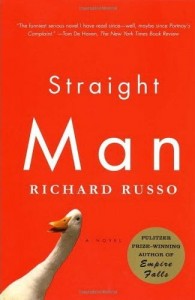 Title: Dept. of Speculation (Goodreads)
Title: Dept. of Speculation (Goodreads)
Author: Jenny Offill
Published: Knopf Doubleday, 2014
Pages: 182
Genres: Contemporary
My Copy: ARC from Netgalley
Buy: Amazon, Book Depository (or visit your local Indie bookstore)
Dept. of Speculation by Jenny Offill tells the story of an unnamed narrator known only as The Wife. This novella charts the narrator through all her uncertainties, as she overanalyses everything in her head from the small things to big things like her marriage. The analysis can invoke anything from Kafka to doomed Russian cosmonauts. The title comes from the letters the wife exchanged with her husband which are postmarked as Dept. of Speculation; the letters were a way to voice her uncertainties. However as the two drifts further apart she starts to lose this outlet, which could be her inherit downfall.
This novella offers a very real look at a person’s life who overanalyses everything. Now I am not going to tell you whether or not this narrator is unreliable or anything like that. I think this is something the reader needs to determine for himself or herself. It doesn’t matter either way, this book takes something intensely real and, at times, this can be a little too real. The way Offill has captured this character’s thoughts and emotions is what makes this book both deep and meaningful.
There is however a huge flaw in this novel, something that was pointed out by a friend before I went into this book. In the edition I read there was a huge amount of italicised text and not all of it was referenced. There are times that the author states who said the quotes and then for the most part leaves quotes unreferenced. While normally I have no problem with no referencing within fiction, but when it takes up a large chunk of the writing, it starts to become a problem. Especially when you find text that speaks to you but it is italicised. Was it a famous quote and was she trying to pass this off as her own words?
There is great beauty within this novella and there is a lot to love about it. This large flow I found with the novel really caused a problem which is a shame. I love books that explore complex human emotions and thoughts, Julian Barnes does this really well and Jenny Offill is just as good. I wanted to love this book and jump on the bandwagon but I couldn’t. I try to wonder if I would have the same problem if it wasn’t pointed out to me before I started this novel, I like to think I would but this friend always puts me to shame when it comes to critical analysis.

 Title: Gone Girl (
Title: Gone Girl ( Title: The Year of Reading Dangerously (
Title: The Year of Reading Dangerously ( Title: Straight Man (
Title: Straight Man ( Title: How to Build a Girl (
Title: How to Build a Girl ( Having recently read
Having recently read  Title: The Ways of the World (
Title: The Ways of the World ( Title: Levels of Life (
Title: Levels of Life ( Title: Black Widow, Vol. 1: The Finely Woven Thread (
Title: Black Widow, Vol. 1: The Finely Woven Thread ( Title: Landline (
Title: Landline (